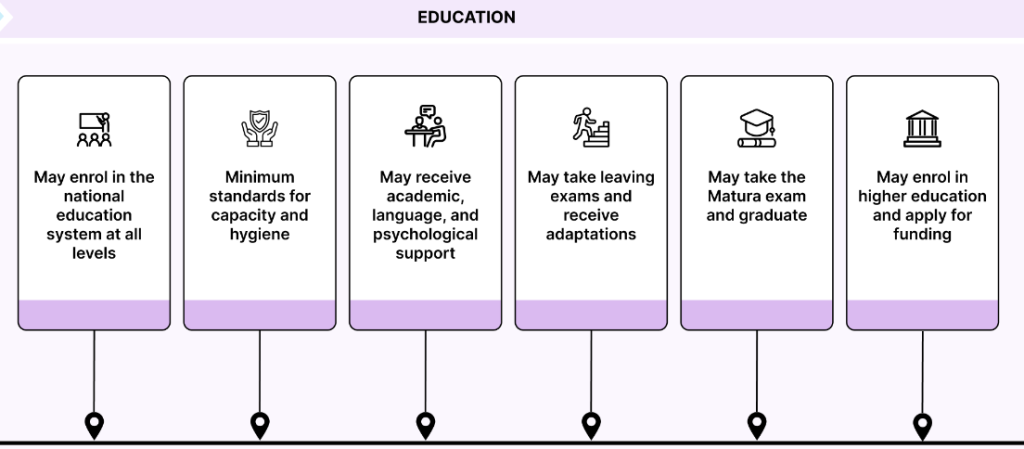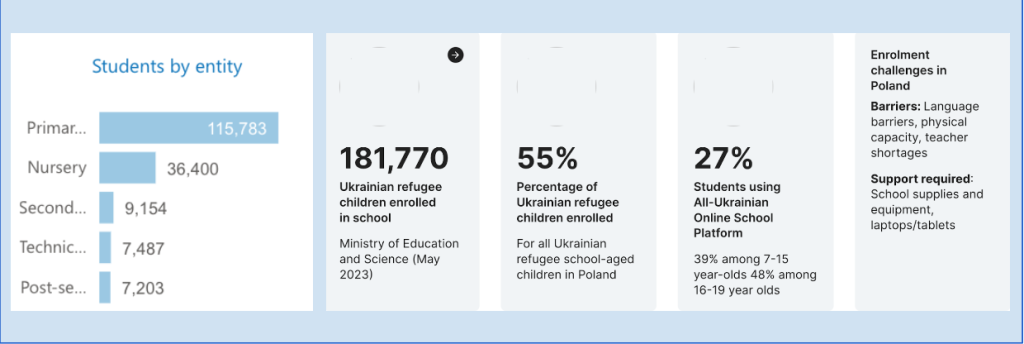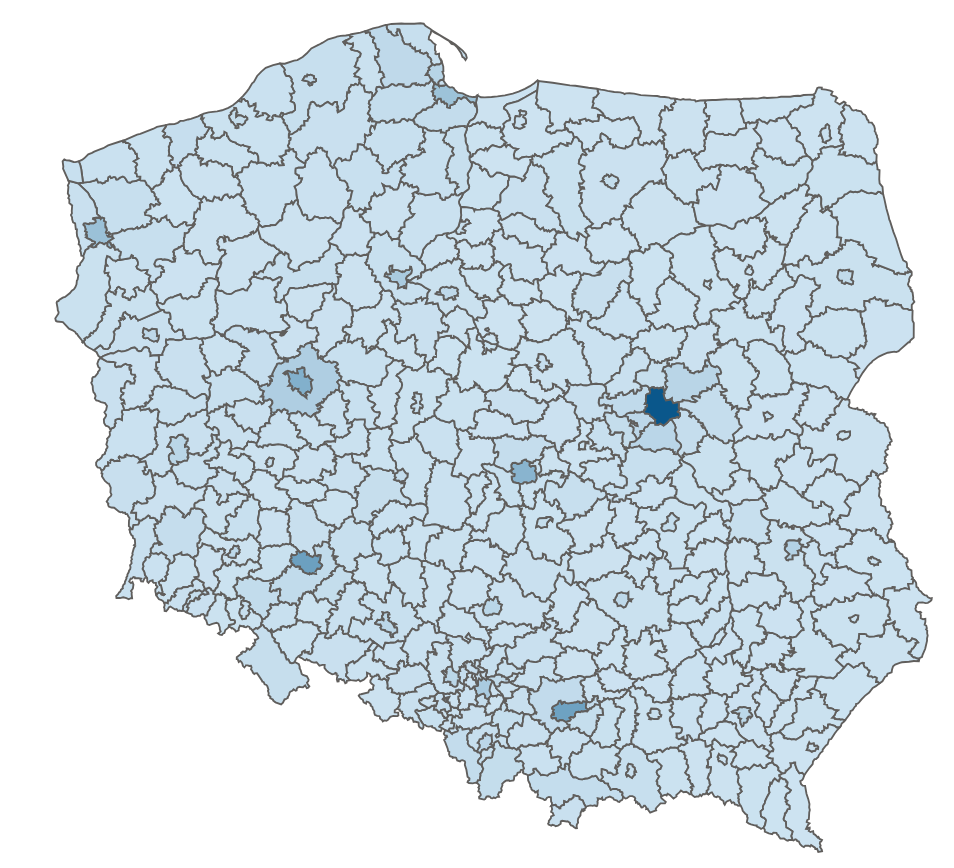UNICEF and its partner organizations are hard at work, designing programs and campaigns to integrate refugee children into host country schools. Their most recent initiatives following Russia’s invasion of Ukraine in February 2022 and the subsequent flood of Ukrainian refugees into Poland sheds light on swift and creative ways to enroll a greater number of refugee children in the national education system, with ongoing successes and challenges.
Reaffirming refugee access to Polish national schools
Of the 1.4 million Ukrainian refugees who initially fled to Poland in spring 2022, over 700,000 were estimated to be school-aged children (UNESCO, 2023). The UNICEF Refugee Response Office in Poland was established in record time in March 2022 to support families with resources while recovering from war (Kacprzak, 2023). The Polish government also quickly acted to provide Ukrainians with immediate access to the Polish education system (Sejm, 2022). Thus began the partnership between UNICEF, the Polish Ministry of Education and Science, NGOs, and the 12 municipalities with the highest concentration of Ukrainian refugees, to ensure that children were able to enroll in the national education system, accredited learning, or technical training (UNICEF, 2023).

Ukrainian refugees in Poland follow this pathway for integration (UNESCO, 2023)
UNICEF initiatives to integrate Ukrainian children into Polish National Schools
UNICEF’s top priority has been to encourage Ukrainian families to enroll their children in Polish schools. They have also trained teachers in multicultural classroom management through a cutting-edge Learning Passport app, hired Ukrainian teaching assistants, and distributed school supplies to both Polish and Ukrainian children. Additional emergency support comes in the form of Blue Dot Hubs, Polish language summer camps, and interactive activities to ensure healthy social-emotional learning and relations with peers (UNICEF, 2023).
In spring 2022, UNICEF Poland and partners enrolled about 55%, or 185,000 of Ukrainian refugee children into Polish primary and secondary schools, while the other half continued their Ukrainian school studies online or did not enroll in school at all (UNICEF, 2022). Today, similar enrollment numbers remain, at about 36,400 in Polish nurseries and pre-schools, 115,783 in Polish primary schools, and only 9,174 in Polish secondary schools. Meanwhile, about 27% of Ukrainian children in Poland are fully enrolled in an “All-Ukraine Online School Platform,” 40% of which are 7-15 years old (UNHCR, 2023). This has created tensions between UNICEF and Ukrainian families, who have a difficult decision to make about whether or where to enroll their children and which system will have the most beneficial impacts.

UNESCO, 2023

Ukrainian Refugee Students by Powiat (Municipality) (UNHCR Operational Data Portal, 2023)
Promoting in-person, integrated education for social cohesion
UNICEF argues that Ukrainian families should send their children to Polish school, in-person, especially primary school. Monika Kacprzak, communications specialist at UNICEF Poland, shares that they are running a ‘back to the classroom’ campaign to help foster a sense of belonging, community, mental well-being, and social cohesion for Ukrainian students and their Polish peers. She emphasizes the use of ‘social cohesion’ instead of ‘integration,’ as the latter may create the perception of forced assimilation. Her team wants children to feel fully safe and welcomed in schools, while improving their mental health, social skills, and friendships with Polish children, which is best done in person. (Kacprzak, 2023). Kacprzak’s comments on social cohesion aligns with that of the United Nations Development Program (2007): social cohesion involves “a society where all groups have a sense of belonging, participation, inclusion, recognition, and legitimacy.” Kacprzak also reveals that enrolling more Ukrainian children in Polish schools can influence more funding to strengthen Polish national education capacities as a whole. Indeed, in January 2023, the Polish government did offer additional funding for schools supporting Ukrainian students, including funding to buy textbooks, materials, supplies, hire non-Polish assistants, psychologists, and other specialists to provide free psychological and pedagogical support for children (UNESCO, 2023).
“We invest in strengthening the Polish school system to expand access to quality education. Our investments benefit both Ukrainian and Polish children”
(UNICEF, 2023)
This shows how the pursuit of increasing access to education can, in fact, influence other development goals, such as SDG 16- “Promote peaceful and inclusive societies for sustainable development, provide access to justice for all and build effective, accountable and inclusive institutions at all levels” (UN, 2015).”
Measuring social cohesion among Polish and Ukrainian children
While this is an ongoing crisis, initial takeaways have emerged. Enrolling Ukrainian children in Polish schools has positively impacted Poles’ tolerance, hospitality, and social relations. According to a poll conducted by Warsaw University and partners, about 80% of the Polish public supported Ukrainian children being admitted to Polish schools, and that support has not changed more than a year later (Krzysztoszek, 2023). Government officials, municipalities, teachers, and families have been very receptive to the UNICEF programs, especially because they were distributing materials equally to both Polish and Ukrainian children.
UNICEF has an ‘accountability to affected population’ team that has implemented feedback mechanisms into each program they’ve designed for Polish teachers, children, and Ukrainian children and their families to measure outcomes. They sent surveys and response forms to the 12 municipalities to gauge opinions about the programs, materials, and outcomes in their schools. They also receive SMS, phone calls, and emails with feedback from families. While the responses have not been published in any formal report, Kacprzak mentions some examples of strong social cohesion: Polish children inviting Ukrainian children to go the playground after school, Ukrainian parents’ involvement in school parent councils, Polish-Ukrainian collaborative art projects, and Polish students helping Ukrainian children read picture books in Polish. “It’s not easy to collect these answers, but we strongly encourage recipients of our programs to tell us if they’re working. We love to go into the field, do programmatic visits, speak with head teachers, and hear from students, “We are happy, we feel at home.” (Kacprzak, 2023).
Unfortunately, both respondents in the Warsaw University poll and Kacprzak admit seeing more anti-Ukrainian attitudes in other areas, such as less support for their access to jobs, healthcare and social services, a growing challenge this war prolongs. “We hope that this sentiment will decline, and that it will not trickle down into the welcoming atmosphere we’re trying to create in classrooms.” (Kacprzak, 2023).
Looking Forward
The constantly evolving nature of the War in Ukraine, the movement of refugees back and forth across the border, and relatively new education initiatives implemented by UNICEF and partners makes it challenging to collect and interpret comprehensive data about the impact of integrative education on overall social cohesion. Changes in social relations and institutions take time to develop, so it is not feasible to make grand conclusions in such a chaotic time. Further, Poland has experienced a teacher decline and shortage during this refugee crisis, from 518,746 teachers in 2020 to 512,102 in 2023 (Sas, 2023), which has created a strain on resources and quality of education (UNESCO, 2023).
Regardless of the longevity of the War in Ukraine and whether Ukrainian children decide to stay in the Polish education system, UNICEF and others’ work in the country has laid the foundation for further integration of other refugee populations. Recently, the European Union has reiterated its Member States’ obligations to integrate thousands of new refugees from outside of Europe into local institutions, which Poland has not had much experience with in the past. (Hajdukovic, 2023). The hope is that by providing and improving access and quality of inclusive, multicultural education for Ukrainian children, Poland will have a greater capacity, willingness, and tolerance to integrate refugee children from other countries and populations. This is the true test of how achieving education goals can further other development goals, namely SDG 16, to allow for more diverse populations to enter Poland and ‘feel at home.’
Works Cited
Hajdukovic, D. (2023, March 15). Integration of migrants and refugees: benefits for all parties
involved. Council of Europe, Committee on Migration, Refugees and Displaced
Persons. https://rm.coe.int/integration-of-migrants-and-refugees-benefits-for-all-parties-involved/1680aa9038
Kacprzak, Monika. (2023, November 23). UNICEF’s programs in Poland. Interview.
Krzysztoszek, Aleksandra. (2023, June 14). Poles less willing to help Ukrainian refugees: poll.
EURACTIV.pl.https://www.euractiv.com/section/politics/news/poles-less-willing-to-help-ukrainian-refugees-poll/
Sas, Adriana. (2023, November 9). Number of teachers in Poland from 2008 to 2023. Statista
https://www.statista.com/statistics/1268829/poland-number-of-teachers/
Sejm of the Republic of Poland. (2022, March 12th). Ustawa o pomocy obywatelom
Ukrainy w związku z zbrojnym konfliktem na terytorium tego państwa (Act on
assistance to Ukrainian citizens in connection with the armed conflict on the territory of the country.)
https://isap.sejm.gov.pl/isap.nsf/DocDetails.xsp?id=WDU20220000583
United Nations Development Programme. (2007). Working Definition of Social Cohesion.
E-dialogue: Creating an Inclusive Society: Practical Strategies to Promote Social Integration. Division of Social Policy & Development. https://www.un.org/esa/socdev/sib/inclusive_society/social%20cohesion.html
UNESCO. (2023, June 15). Poland’s education responses to the influx of Ukrainian refugees.
https://www.unesco.org/en/ukraine-war/education/poland-support
UNHCR. 2023. Operational Data Portal: Ukraine Refugee Situation, Poland: Refugee
Pupils from Ukraine. https://data.unhcr.org/en/dataviz/269?sv=54&geo=10781
UNHCR. (2023). Education Report 2023- Unlocking Potential: The Right to Education and
UNICEF (2022, September 1). As children return to school in Poland, UNICEF highlights
importance of getting those who’ve fled war in Ukraine back to learning.
https://www.unicef.org/eca/press-releases/children-return-school-poland-unicef-highlights-importance-getting-those-whove-fled
UNICEF. (2023, July 10). More than half of Ukrainian refugee children not enrolled in schools in

